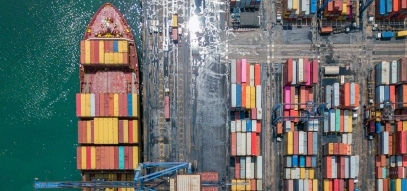For some transport and logistics companies, Covid-19 has been a time of going above and beyond for clients and customers. For others it has been a time of difficulty, searching for ways to fill supply chain gaps and struggling to operate as normal. Companies that have responded well have most often been those with standout technology in place. Access to RPA as well as cybersecurity and advanced IT skills has given businesses the competitive advantage by enabling their teams to work effectively, securely and remotely at a moment's notice.
Sébastien Ledent Partner, Mazars
From crisis to innovation – an opportunity for RPA in transportation
From crisis to innovation – RPA in transportation
Some of the most damaging impacts so far include:
A sudden and dramatic drop in activity: Air traffic has decreased by more than 80% worldwide and is not expected to regain its pre-pandemic level until 2023, at the earliest. This slowdown has led to significant job losses, estimated to reach as many as 5m by the end of 2020.
A lack of cash: Less activity is crippling cashflow for many transportation companies, causing delayed payments and pushing problems down the supply chain.
Not all areas of transportation have been hit as hard; for example, it has been business as usual for the logistics and delivery sector, which in many cases has seen increased demand. Nevertheless, the reverberations of the crisis seem likely to touch the whole industry in some way, and state aid might not be enough to keep heads above water, particularly where small and medium-sized businesses are concerned.
An opportunity for disruption?
However, while the pandemic has caused short-term pain for many, as with all financial crises, it can also be an opportunity for growth and disruptive thinking. New challenges and a new environment can be the inspiration for innovation and spark changes which were long overdue. The use of RPA (robotic process automation) may be just one of those innovations.
Benefits of RPA for automating repetitive processes
RPA has been a trending topic in transportation for the last few years, but a post-Covid drive for efficiency could be the spur it needs to come into its own. As a way of automating repetitive, time-consuming manual tasks, there are numerous advantages to adopting RPA in daily processes, such as freeing up employees to focus on value-added work such as performance piloting or data analysis, while also reducing costs. It also helps with risk mitigation, by eliminating human error and provide a clear workflow for repetitive processes.
Typical uses of RPA in transportation
RPA is particularly well suited to the finance function, which still involves numerous repetitive processes. For example:
- Order to cash
Cash is critical to ensuring a business can survive (and thrive) during a crisis, which is why having a high performing order-to-cash process is a strategic asset. RPA can help transportation businesses to accelerate cash collection by automating the manual treatments involved, while also improving claim and contract management, invoice generation and accounting. - Purchase to pay
Symmetrically, RPA can also be deployed to optimise the purchase to pay process, ensuring that organisations respect payment periods and help small and medium-size businesses to maintain their cashflow during these difficult times. Incorporating RPA into purchase to pay can improve other elements of the process, including purchase order receipt and validation, invoice recognition and accounting and claim management regarding orders. - Planning and operations
Within the operations department of transportation companies, large amounts of data traditionally have to be received, assessed, processed, captured and reported. The inbound and outbound data is received and forwarded to and from different sources and systems, such as email, pdf, EDI, portals, ERP systems and TMS. Handling of this can be standardised, for example where you have simple planning checks to assess capacity availability of trucks, tanks, trailers or drivers on diverse locations or handling hours administration of fulltime and flexible workers such as drivers and warehouse operators. In principle, these activities do not require much intelligence and attention, and RPA can carry out these actions faster, better and more cheaply. RPA handles all standard processes and any exceptions requiring careful handling and consideration will be directed to staff.
A first step towards Artificial Intelligence (AI)
Discussions about digital transformation have introduced a multitude of buzzwords relating to artificial intelligence: machine learning, deep learning, natural language processing, and so on. However, companies are still reluctant to engage in such projects, put off by the cost and complexity, not to mention questions over the return on investment (ROI) they will see as a result.
In contrast, RPA is fast to implement - avoiding the need for extensive change management - while being more affordable and achieving faster ROI. This makes it the ideal first step towards digitisation, paving the way for the use of more sophisticated AI technologies in the future.
As the transportation industry continues to reel from the Covid-19 crisis, RPA provides an affordable solution for improving financial efficiency and optimising treasury matters. For more information or to discuss how RPA can help your business, please get in touch with us below.
For more information or to discuss how RPA can help your business, please get in touch with us below.
Written by Sébastien Ledent, Partner at Mazars.




